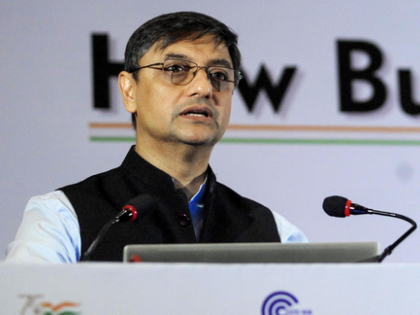GST 2.0 is a process reform for efficiency, not just revenue: Sanjeev Sanyal
By IANS | Updated: September 9, 2025 20:00 IST2025-09-09T19:59:48+5:302025-09-09T20:00:09+5:30
New Delhi, Sep 9 Sanjeev Sanyal, member of the Economic Advisory Council to the Prime Minister, said on ...

GST 2.0 is a process reform for efficiency, not just revenue: Sanjeev Sanyal
New Delhi, Sep 9 Sanjeev Sanyal, member of the Economic Advisory Council to the Prime Minister, said on Tuesday that the new GST 2.0 framework is primarily a process reform designed to improve efficiency rather than just maximise revenue collection.
Speaking at NDTV Profit’s GST Conclave, he explained that the rationalisation of tax slabs marks a major shift in simplifying the system and reducing unnecessary complexity.
“India’s new GST framework has finally been rationalised to make it simpler and more efficient,” he mentioned.
Sanyal added that the government had been working towards rationalisation for over a year, but the timing had to wait until India’s fiscal system was stronger after the Covid-19 years.
“When you reduce rates and rationalise them, there will be a one-time reduction in tax collection,” he explained, adding that earlier decisions on keeping some goods in higher tax brackets were not based on deep strategy but on avoiding disruption.
“For example, cement was kept in the 28 per cent slab simply because it was the least disruptive choice,” he noted.
He recalled how earlier debates over tax rates even went down to “whether to tax salty versus caramel popcorn,” but now the system is clearer.
“With rationalisation, common sense will broadly be able to tell you what falls under which slab,” he said.
The senior economist also flagged that “inspector raj had come back into the GST registration process,” but said the framework has now been cleaned up.
He emphasised that while India may have already implemented most big structural reforms, what is needed now are “a thousand process reforms” to ensure smooth governance and business ease.
On the broader economic front, Sanyal said India has both fiscal and monetary space to support micro, small and medium enterprises.
The GST Council recently approved a new two-slab structure, scrapping the 12 per cent and 28 per cent brackets, lowering taxes on daily essentials like ghee, butter, roti, shampoo, hair oil and toothpaste, while increasing levies on a few selected items.
Finance Minister Nirmala Sitharaman announced that the new rates will come into effect from September 22, the first day of Navratri.
Disclaimer: This post has been auto-published from an agency feed without any modifications to the text and has not been reviewed by an editor
Open in app